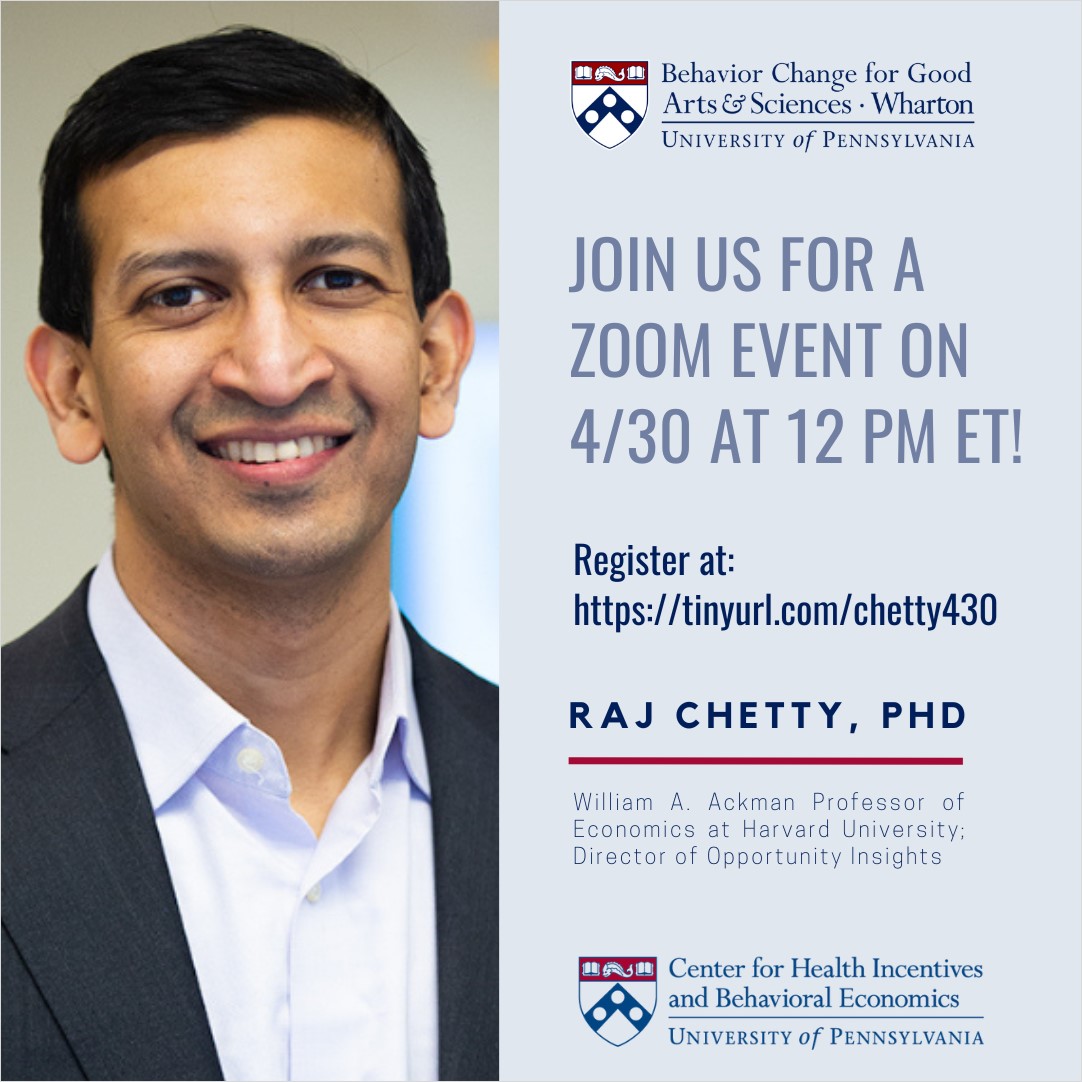
Behavior Change for Good Initiative
@behaviorchange
@Wharton @Penn Initiative led by @katy_milkman & @angeladuckw unites star #BehavioralScientists with organizations to advance the science of behavior change
ID: 1004433705727942656
https://bcfg.wharton.upenn.edu 06-06-2018 18:43:51
1,1K Tweet
9,9K Followers
192 Following


🚨New Book Alert - Unforgiving Places: The Unexpected Origins of American Gun Violence 🚨 Team Scientist Jens Ludwig discusses how behavioral science can be leveraged to better understand causes and potential solutions to gun violence in America. Order here:


🚨On 4/30 at 12 pm I'm co-hosting a 1 hour ZOOM seminar YOU CAN ATTEND🚨 featuring one of the academics I admire most: Harvard University economist, Raj Chetty 🤩 Join me and Kevin Volpp to learn about Raj's latest research on inequality and ask Q's. Sign up: tinyurl.com/chetty430


Team Scientist podcast roundup: Alison Wood Brooks on Armchair Expert Podcast bit.ly/3FBmd4W Hengchen Dai on Business Talk bit.ly/3DVRQ8L Cait Lamberton on Knowledge at Wharton whr.tn/3RiyCNC

Tomorrow (Wednesday, 4/30) is the second keynote of Penn Center for Health Incentives+Behavioral Econ's Spring Research Seminar Series featuring Harvard Professor Raj Chetty. BCFG is co-hosting the event & we hope you’ll join us!: bit.ly/4jKABH5

A new paper by Team Scientist Colin Camerer & co-authors found that mood affects risk preferences differently by age. When in a good mood, teens tend to choose balanced risks (equal chance of loss or gain), while young adults lean toward safer options: bit.ly/4iHx1xb


ICYMI: The first keynote of Penn Center for Health Incentives+Behavioral Econ’s Spring Research Seminar Series, the event featuring Team Scientist Nicholas A. Christakis and co-hosted by Co-Director Katy Milkman is now available on our Youtube channel! Watch it here: bit.ly/4jewUc8


📢The Penn Medicine Nudge Unit is hosting the 2025 Nudges in Health Care Symposium in Philadelphia on Sept. 11-12! Register to attend the event: bit.ly/3Ssp2IA Submit your abstract by May 23 to be considered for a poster or oral presentation: bit.ly/3Z2xP7U



🚨New Book Alert - Negotiation: The Game Has Changed 🚨 Team Scientist Max Bazerman offers insights on how to adapt negotiation strategies to today’s challenging contexts, such as virtual meetings or supply chain crises. Order here: amzn.to/423d6lh


A recent Journal of Econometrics paper by Team Scientists Susan Athey & Jann Spiess and Niall Keleher used machine learning to identify which students benefit most from digital nudges to renew financial aid. They found that nudging students who were least likely to renew was




ICYMI: The second keynote of Penn Center for Health Incentives+Behavioral Econ’s Spring Research Seminar Series, the event featuring Harvard Professor Raj Chetty and co-hosted by Katy Milkman & Atheendar Venkataramani is now available on our YouTube channel! Watch it here: bit.ly/4kgDjnE




🚨 New Book Alert: Algorithmic Harm Team Scientist Cass Sunstein & co-author Oren Bar-Gill identify ways in which AI could harm consumers through exploiting decision-making biases & explore policy responses that could reduce future risk. Order here: amzn.to/3YANoUn


New research from Team Scientist Olivia S. Mitchell shows that adults’ financial literacy tends to decline with age, regardless of their education level. Read more in this Knowledge at Wharton article: whr.tn/42AF4Fl

How should AI reshape labor markets? Team Scientist 𝐒𝐞𝐧𝐝𝐡𝐢𝐥 𝐌𝐮𝐥𝐥𝐚𝐢𝐧𝐚𝐭𝐡𝐚𝐧 argues that instead of designing AI to replace human work, we should focus on using it to enhance human capabilities. Read more in this The Wall Street Journal article: on.wsj.com/42S9NxM


Team scientist podcast roundup: @Katy_Milkman on Knowledge at Wharton whr.tn/42ztvPz Nicholas A. Christakis on Inside AI spoti.fi/4dmKpom @LaurieSantos on Love Factually by Eli Finkel spoti.fi/4dqzBWz



